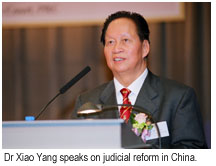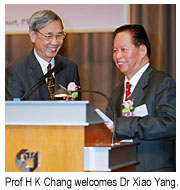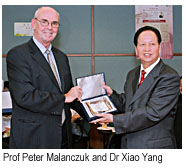The judicial system in China and its reform
Karen Lai
In his welcoming speech, CityU's President, Professor H K Chang, said it was a great pleasure to invite Dr Xiao to speak on the judicial system in China. “This week we are celebrating Congregation during the 20th Anniversary of the University, and it is a further honour to welcome Dr Xiao to our campus at this time. From its start 11 years ago, our School of Law (SLW) has upheld a clear mission to develop comparative law in China ,” Professor Chang said. “A good legal system serving society’s needs and the rule of law are important to the development of a country. The judicial reform of China relates to the future of Chinese people in the world and the rule of law is an important milestone in the modernization of China.”
Graduated from the Department of Law of the People’s University of China in 1962, Dr Xiao Yang is currently President and Chief Justice of the Supreme People's Court, PRC. He has served as Procurator-General of the Guangdong Provincial People’s Procuratorate, as Deputy Procurator-General of the Supreme People’s Procuratorate, and as Minister of Justice. He set up the first criminal reporting centre for the general public, the first bureau against corruption, and established a legal aid system in China.
The judicial system in China, its now and future
Dr Xiao opened his lecture by asserting that in addition to economic reforms, China is also committed to democratic reform of the legal system by laying down the foundations of the rule of law in legislature, law enforcement, and the judiciary, and by raising the general public's awareness of law. Corresponding with today's global trend, judicial reforms have begun in China. Dr Xiao’s lecture presented a thorough and inspiring discussion of the future of judicial reform in China, focusing on three main areas: the judicial system; judges system; and the trial system.
Dr Xiao maintained that China’s legal and judicial systems are very inclusive and rich in nature. He explained that China’s judicial system is close to the Continental system but has its own unique features. In China, the judicial system is responsible to the People’s Congress and, under the authority of the People’s Congress, there is a division of power among the executive, judiciary, and procuratorial organs, which all have different roles and responsibilities. The judiciary is independent from the executive branch, but under the supervision of the People's Congress and its Standing Committee, in areas such as appointment of judges, law enforcement and review of reports.
On the judges system, Dr Xiao stressed the importance of a well developed judges system covering the areas of recruitment, appointment, training and examination of judges. He said that the professionalism of mainland judges has been rising and training would be provided to enhance the professional qualifications of judges on the mainland. He also discussed the latest development of reforms in trial system and the development of an open jury and appeal system.
Dr Xiao further explained that though Hong Kong and China have been adopting two different legal systems -- the common law system in Hong Kong and the socialist style continental system on the mainland, he believed the two could complement each other. Under the "one country, two systems" policy, Dr Xiao looked forward to more collaboration with legal practitioners in Hong Kong concerning judicial reforms. “The future of the mainland judicial system needs the full support of Hong Kong people. We strongly believe Hong Kong's future is significant for the development of judicial system in mainland China,” he added. (Please click for the full text of Dr Xiao Yang's lecture.)
Impressed by CityU's legal education and resources
Before his lecture, Dr Xiao Yang and his seven-member delegation visited the School of Law (SLW) and the Run Run Shaw Library. Accompanying Dr Xiao and the other guests were: Professor Y S Wong, Vice President (Administration); Professor Peter Malanczuk, Dean of SLW and Chair Professor; Dr Priscilla Leung, Associate Professor of the SLW; Dr Zhu Guobin, Director of the External Liaison and Cooperation Office; and Professor Steve Ching, the University Librarian.
Introducing the mission of the SLW, Professor Wong said that CityU's Department of Law was established as the second law school in Hong Kong in 1987. In addition to meeting the needs of the local community, the SLW has a strong commitment to comparative and international law, with a special interest in Chinese law. Professor Peter Malanczuk explained the School’s academic structure, research focus, academic programmes; he introduced its academic faculty recruited from different parts of the world, the School’s international and regional links and its plans in the context of legal education in
Hong Kong and the region.
Dr Xiao expressed his gratitude to the University for the Honorary Doctorate. He welcomed more exchanges between academics of CityU and judges of the mainland. He commended CityU’s contribution to the prosperity and stability of Hong Kong and CityU's ranking among the best 200 universities in the world by the UK's Times, and among the top ten universities in Greater China for two consecutive years by Shanghai Jiao Tong University surveys. Dr Xiao and the guests had a warm discussion with SLW staff and students on topics such as the features of the School’s academic programmes -- the PCLL, the Global Gateway LLM, international exchange programmes, the prospects of Hong Kong law graduates on the mainland, and CityU's future endeavors and collaboration with
mainland and overseas universities.
After meeting the SLW faculty, Dr Xiao visited the Legal Collection of the Run Run Shaw Library. Professor Steve Ching, Dr Leung and library staff introduced the guests to the English Law Special Collection, the Chinese Legal History Special Collection, and a wide range of electronic resources. The guests were impressed by the enthusiasm of the staff, the supportive learning environment and the ambience conducive to learning at CityU.





